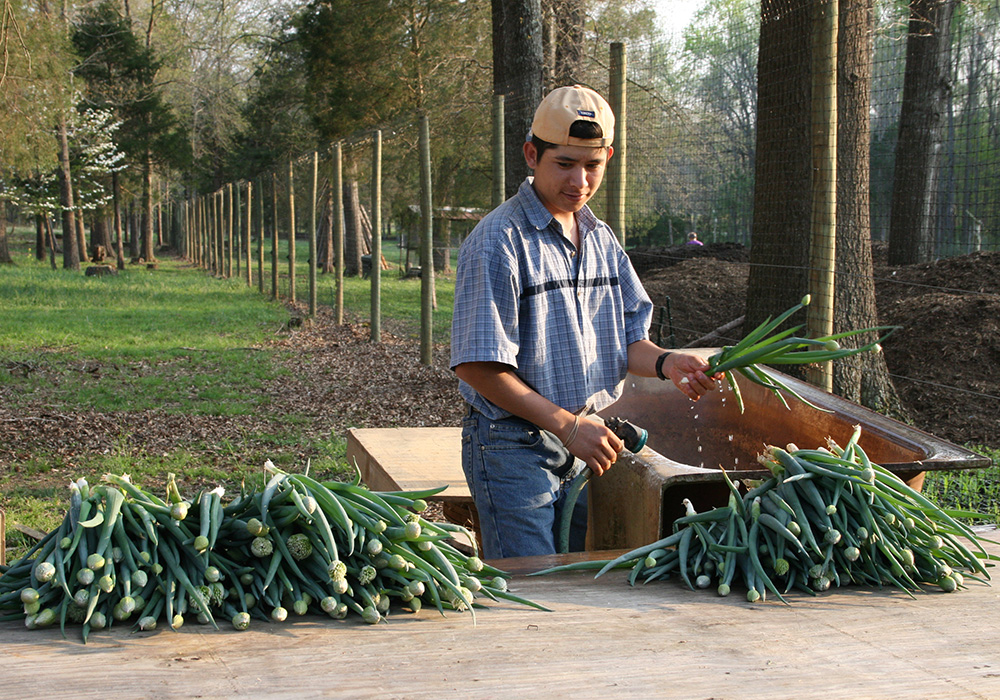Register Now for Extension’s Postharvest Handling Workshop for Farmers
go.ncsu.edu/readext?454386
en Español / em Português
El inglés es el idioma de control de esta página. En la medida en que haya algún conflicto entre la traducción al inglés y la traducción, el inglés prevalece.
Al hacer clic en el enlace de traducción se activa un servicio de traducción gratuito para convertir la página al español. Al igual que con cualquier traducción por Internet, la conversión no es sensible al contexto y puede que no traduzca el texto en su significado original. NC State Extension no garantiza la exactitud del texto traducido. Por favor, tenga en cuenta que algunas aplicaciones y/o servicios pueden no funcionar como se espera cuando se traducen.
Português
Inglês é o idioma de controle desta página. Na medida que haja algum conflito entre o texto original em Inglês e a tradução, o Inglês prevalece.
Ao clicar no link de tradução, um serviço gratuito de tradução será ativado para converter a página para o Português. Como em qualquer tradução pela internet, a conversão não é sensivel ao contexto e pode não ocorrer a tradução para o significado orginal. O serviço de Extensão da Carolina do Norte (NC State Extension) não garante a exatidão do texto traduzido. Por favor, observe que algumas funções ou serviços podem não funcionar como esperado após a tradução.
English
English is the controlling language of this page. To the extent there is any conflict between the English text and the translation, English controls.
Clicking on the translation link activates a free translation service to convert the page to Spanish. As with any Internet translation, the conversion is not context-sensitive and may not translate the text to its original meaning. NC State Extension does not guarantee the accuracy of the translated text. Please note that some applications and/or services may not function as expected when translated.
Collapse ▲SUCCESSFUL STRATEGIES FOR THE PRODUCE FARM:
WINNING THE FOOD SAFETY RACE WITH PROPER POSTHARVEST HANDLING
UPDATE March 21: This workshop is FULL.
Do you have questions about…
- maximizing the quality of your fruits and vegetables through your postharvest practices?
- adhering to food safety recommendations and National Organic Program requirements?
- minimizing food safety risks in the packinghouse?
If so, you are not alone! Join us for a day long workshop where we will focus on postharvest management practices that can help you get the longest shelf-life for your products while making sure all the food safety boxes are checked. The workshop will include sessions at a local farm! In addition to learning the best postharvest management practices, participants will leave with a grower kit valued at more than $300 to help them implement what they learn on the farm!
WHEN: Thursday, April 6th, 8:30 a.m. – 4:30 p.m.
WHERE: Chatham County Agriculture & Conference Center in Pittsboro, NC
Breakfast and lunch will be catered by Angelina’s Kitchen and highlight local foods.
AGENDA:
8:30-9:00 a.m. Check-in and breakfast
9:00-9:15 a.m. Welcome and introductions
Debbie Roos, Chatham County Cooperative Extension
9:15-9:45 a.m. Know your enemies: pathogens associated with produce
Faith Critzer, University of Tennessee
9:45-10:45 a.m. Keeping a clean (packing)house: eliminating the risk of packinghouse cross-contamination
Annette Wszelaki, University of Tennessee
10:45-11:00 a.m. Break
11:00 a.m.-11:45 a.m. Blue ribbon produce: postharvest practices to get the longest shelf-life from your crops
Penelope Perkins-Veazie, North Carolina State University
11:45 a.m.-12:00 p.m. Local Resource for Making Value-added Products: Piedmont Food and Agriculture Processing Facility
Eric Hallman, Piedmont Food and Agriculture Processing Facility
12:00-1:00 p.m. Networking lunch
1:00-1:30 p.m. When, where, why, and how: sanitizer application for postharvest water
Faith Critzer, University of Tennessee
1:30-2:00 p.m. National Organic Program standards for postharvest sanitizers
Annette Wszelaki, University of Tennessee
2:00-2:30 p.m. Travel to Granite Springs Farm
2:30-3:00 p.m. Farm tour
3:00-4:00 p.m. Putting the right tools in the toolbox: packinghouse management and sanitizer application in postharvest water (hands-on)
4:00-4:40 p.m. Return to Pittsboro
REGISTRATION: This workshop is FULL.
ABOUT THE PROJECT: A group of researchers and extension professionals at NC State University and the University of Tennessee have been collaborating on a project focusing on postharvest washing in organic fruit and vegetable operations, which was supported by the USDA Organic Agriculture Research and Extension Initiative. The team’s research has focused on evaluating experimental essential-oil based compounds for their antimicrobial activity in produce washing as an alternative to traditional compounds such as chlorine. Our outreach efforts are centered on helping growers implement food safety best practices in their packinghouse.



